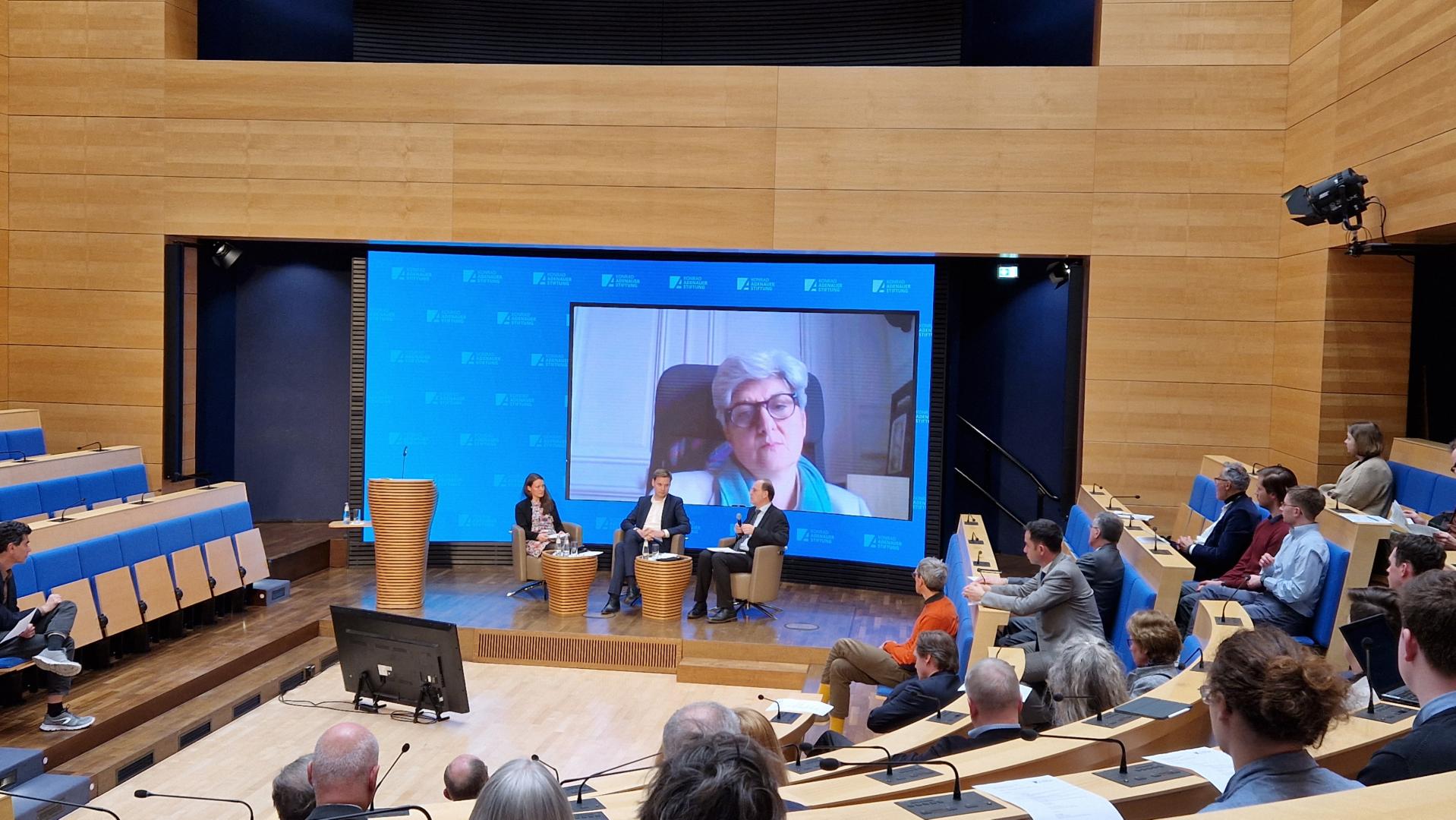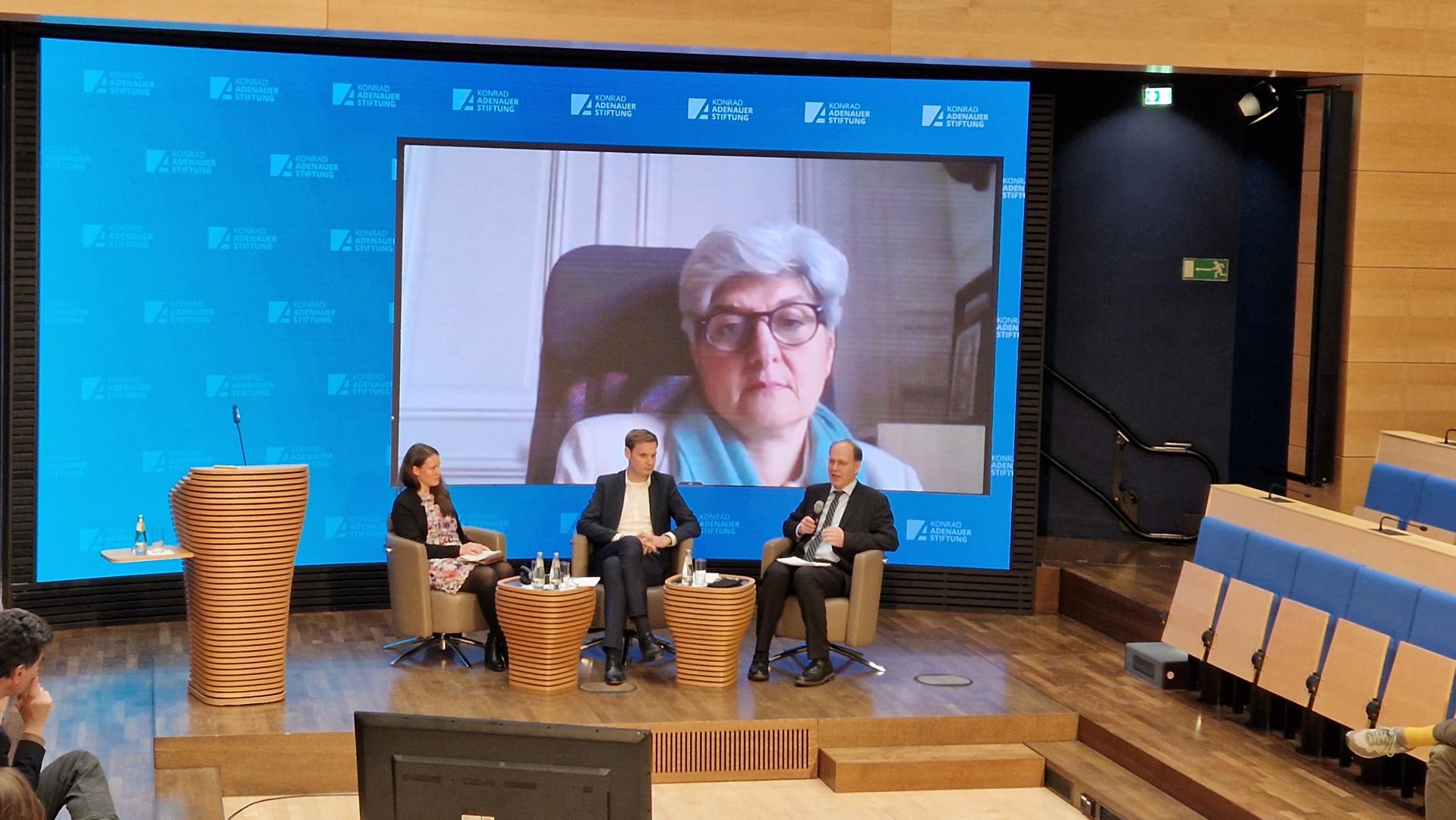After a welcome address by Caroline Kanter, Deputy Head of the European and International Cooperation Department, Dr. Michael Meister MP, former State Secretary and rapporteur of the CDU/CSU parliamentary group for the Stability and Growth Pact, gave a keynote speech on the importance of effective, uniform rules for the fiscal stability of the EU. In the subsequent panel discussion with Sylvie Goulard, former Vice-President of the Banque de France, Yannick Bury MP, also rapporteur of the CDU/CSU parliamentary group for the Stability and Growth Pact, and Prof. Dr. Thiess Büttner, holder of the Chair of Finance at the Friedrich-Alexander University Erlangen-Nuremberg, and moderated by Sarah Ciaglia of the European Central Bank, German and French perspectives were exchanged and lines of compromise sought. The results were summarized in a closing statement by Tim Peter, policy advisor for the Competitiveness of Europe.
Realistic debt reduction paths
It became clear that, in view of the high debt levels of some member states, the EU debt rules seem like something from another era: In particular, some member states have significantly exceeded the Maastricht debt level of a maximum of 60 percent of gross domestic product (GDP). For example, according to Eurostat data, Greece reached a debt level of around 171 percent of GDP in 2022, Italy around 144 percent, Spain around 113 percent and France around 112 percent – debt levels that will be difficult to reduce within 20 years, as required by the rules.
There was therefore widespread consensus that the debt reduction paths must also be designed realistically for member states with very high debt levels. This would mean reforming the so-called one-twentieth rule, which requires the debt ratio to be reduced to the Maastricht criterion of 60 percent of economic output in one-twentieth increments of the difference between the Maastricht criterion and the actual debt ratio. A country would therefore have to reach the 60 percent mark within 20 years. Applying this criterion would mean very harsh austerity measures for countries such as Greece or Italy, which would probably trigger a recession. This would mean that important investments, including in climate protection, would not be made.
Same rules for all
On the one hand, it was emphasized that the current debt rules have so far failed primarily because of their enforcement. An individual, qualitative assessment of member states' fiscal policies by the Commission under the proposed design is therefore a step in precisely the same direction: If the Commission has so far only inadequately ensured the enforcement of EU debt rules, why should it now succeed with even more room for interpretation instead of uniform rules? Rather, what is needed is more automation in the application of EU debt rules and an independent, non-political supervision body. One possibility would be to upgrade the independent European Fiscal Board.
Individual agreements
On the other hand, the need for public investment in challenges facing society as a whole, such as climate protection, strengthening European resilience in the face of the Russian war of aggression on Ukraine and digitization, was emphasized. These should not be thwarted by rigid rules. Reference was also made to the domestic political situation in some more heavily indebted member states of the European Union, which makes medium-term budget consolidation more difficult.
With the presentation of the EU Commission's draft legislation to reform the Stability and Growth Pact, this debate on individual, qualitative debt reduction paths on the one hand and rule-based, quantitative reduction paths on the other will continue. In this context, dialog, especially between Germany and France, is essential.
Topics
About this series
The Konrad-Adenauer-Stiftung, its educational institutions, centres and foreign offices, offer several thousand events on various subjects each year. We provide up to date and exclusive reports on selected conferences, events and symposia at www.kas.de. In addition to a summary of the contents, you can also find additional material such as pictures, speeches, videos or audio clips.








